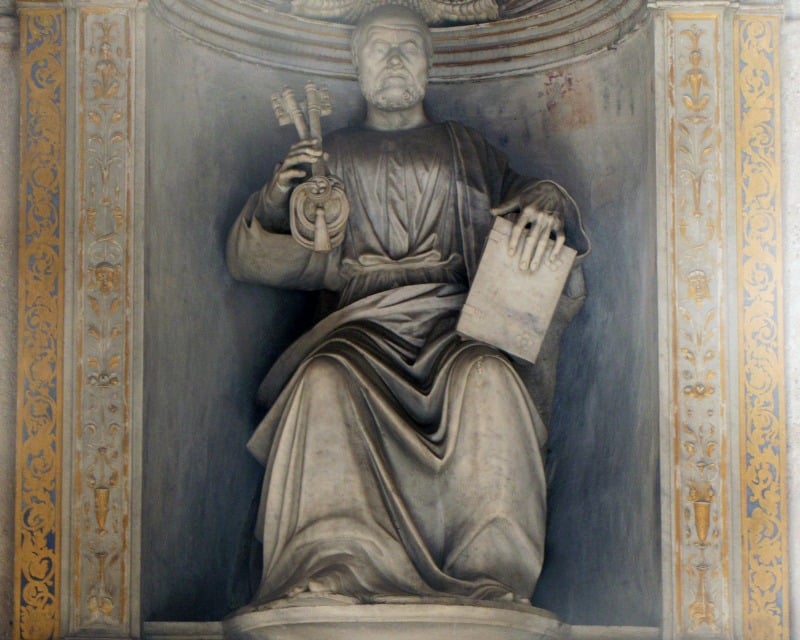 By Steven Zucker via
Flickr (2012), CC BY-NC-SA 2.0
By Steven Zucker via
Flickr (2012), CC BY-NC-SA 2.0
Flávia Ghelardi writes from Brazil in English and Portuguese. Jump to the English version of this post.
No mês de junho celebramos tradicionais as festas juninas, que tem origem na comemoração das festas de Santo Antônio (dia 13), São João Batista (dia 24) e São Pedro (dia 29). Mas qual é a razão da Igreja Católica fazer memória dos santos?
Jesus, no Sermão da Montanha, nos exorta: “Portanto, sejam perfeitos como é perfeito o Pai de vocês que está no céu.” (Mt 5,48) E São Pedro enfatiza: “Assim como é santo o Deus que os chamou, também vocês tornem-se santos em todo o comportamento, porque a Escritura diz: ‘sejam santos, porque eu sou santo’.” (1 Ped 1,15-16). Desta forma, todos nós somos chamados à santidade, essa é nossa real vocação.
Buscar a santidade significa nos esforçar para viver aqui na terra o ideal para o qual o Pai nos criou, buscando em tudo, realizar a sua vontade, mesmo que isso exija grandes sacrifícios. Devemos ter uma vida de oração, cumprir fielmente nossos deveres e procurar ser uma pessoa melhor a cada dia.
Como Deus de amor, o Pai não nos deixa sozinhos nesse árduo caminho. Ele nos deu Maria, nossa Mãe e Rainha, para nos guiar e educar. E também nos mostra o exemplo de tantos irmãos que tiveram os mesmos defeitos que temos, mas oraram com humildade e com muito esforço conseguiram se livrar deles e hoje gozam das alegrias do Céu e intercedem por nós. Por isso a Igreja, como Mestra e Mãe, faz questão de honrar a memória dessas pessoas, os nossos santos canonizados, para nos dar ânimo nessa caminhada rumo ao Céu.
Os santos são pessoas que responderam generosamente esse convite a colocar Deus no centro de suas vidas e são exemplos para cada um de nós, mostrando que é possível sim trilhar esse caminho. A Igreja Católica é tão rica em exemplos de santidade que temos santos de todos os tipos, de todas as origens, profissões, classes sociais, que se santificaram ainda no ventre materno, como é o caso de São João Batista e de outros, que como Santo Agostinho só se converteram na maturidade e clamava a Jesus: “Tarde te amei...”
Dependendo das dificuldades que superaram ou das graças extraordinárias que receberam aqui na terra, cada santo é conhecido por prestar auxílio em situações específicas. Sua missão não acabou quando partiram aqui da terra, mas continuam a realiza-la no Paraíso. Como disse Santa Teresinha do Menino Jesus: “Passarei meu Céu fazendo o bem!”
Santo Antônio é conhecido como “santo casamenteiro” porque enquanto vivia, na época em que a mulher só conseguia se casar se possuísse algum dote, ajudava a moças humildes a conseguirem esse dote e um enxoval para poderem se casar. Há relatos de várias mulheres que conseguiram se casar por intercessão desse santo.
São João Batista é o padroeiro dos que são injustiçados por causa da fé, haja vista que morreu por anunciar o Reino de Deus e pedir a conversão dos pecadores. São Pedro, o primeiro Papa, é o padroeiro dos pescadores (pois era sua profissão antes de seguir Jesus) e das viúvas e viúvos (porque no Evangelho fala de sua sogra, mas não de sua esposa, o que supõe que ele era viúvo). Além disso, ele é representado com chaves na mão, as “chaves do Reino dos Céus”, que Jesus lhe confiou (Mt 16,19).
É importante ressaltar que podemos e devemos pedir a intercessão dos santos, mas jamais fazer “simpatias” ou seguir superstições. Essas práticas vão contra o Primeiro Mandamento, que é “Amar a Deus sobre todas as coisas”, pois estamos colocando nossa fé e nossa esperança em outra coisa, e não em Deus. Além disso, essas simpatias não passam de pura enganação. Elas agem como uma tentação de “obrigar” o santo a cumprir nossa vontade, nos colocando acima da vontade de Deus para a nossa vida.
O Catecismo da Igreja Católica nos ensina: “A superstição é um desvio do culto que rendemos ao verdadeiro Deus. Ela se mostra particularmente na idolatria, assim como nas diferentes formas de adivinhação e de magia”. Portanto é recomendado que se busque o Sacramento da Confissão, caso tenha caído nessa falta, mesmo que não houvesse consciência plena de que estava fazendo errado.
Assim, vamos aproveitar essa época de festas juninas e intensificar nossa oração aos santos que celebramos, resgatando o verdadeiro significado dessas comemorações. Uma dica é procurar conhecer mais a fundo a vida dos santos, não só os “juninos”, e procurar seguir seus exemplos. Para as crianças, uma boa opção é a cada dia contar a história de um santo na hora de dormir e criar desde cedo o hábito de pedir a intercessão dos nossos amigos do Céu.
Why do we celebrate the saints?
In Brazil, we have in June, the traditional “June Festivals,” originating from the celebrations of Saint Anthony (on the 13th), Saint John the Baptist (on the 24th) and Saint Peter (on the 29th). In these festivals, we have special dances, typical food, different games, bonfires, fireworks, all in honor of those dear saints. But what is the reason the Catholic Church honors the memory of the saints?
Jesus, in the Sermon of the Mountain, tells us: “Be perfect, therefore, as your heavenly is perfect.” (Mt 5:48) Saint Peter emphasizes: “But just as he who called you is holy, so be holy in all you do; for it is written: “Be holy, because I am holy.” (1 Peter 1:15-16). This way, all of us are called to be holy; this is our true vocation.
[tweet "Our true vocation is holiness. #saints"]
To search for holiness means to strive to live here on Earth the ideal for which the Father has created us, trying to carry out His will in everything, even if it demands big sacrifices. We should have a prayer life, faithfully fulfill our duties, and seek to be a better person each day.
As God is love, the Father doesn't leave us alone in this hard path. He gave us Mary, our Mother and Queen, to guide and educate us. He also show us the examples of so many brothers and sisters who had the same faults that we have, but with prayer, humility, and a lot of effort were able to overcome them. Today they enjoy the happiness of Heaven and intercede on our behalf. That is the reason the Church, as Master and Mother, makes a point of honoring the memory of those persons, to give us encouragement in our way to Heaven.
The saints are people who generously answered this invitation to put God in the center of their lives and are examples to each one of us, showing it is indeed possible to tread this path. The Catholic Church is so rich in examples of holiness that we have saints of all kinds, of all origins, professions, social classes, some who were sanctified still in the womb of his mother, such as Saint John the Baptist and others, like Saint Augustine who only converted in adulthood and cried to Jesus: “I loved you late . . .”
Depending on the difficulties they overcame or the extraordinary graces they received here on Earth, each saint is known to help in specific situations. Their mission was not finished when they left Earth, but they keep on fulfilling it in Heaven. As Saint Therese of Lisieux once said: “I'll spend my Heaven doing good!”
Saint Anthony is known in my culture as the “marriage-maker saint,” because while he lived, in a time when a woman only got married if she had a dowry, he helped poor young women to get this dowry and a layette so they could marry. There are reports of many women who were able to find a husband asking the intercession of this saint.
Saint John the Baptist is the patron of the ones wronged because of the faith, considering that he died because he announced the Kingdom of God and asked for the conversion of the sinners. Saint Peter, the first Pope, is the patron of the fishermen (it was his profession before he followed Jesus) and the patron of the widows (because the Gospel talks about his mother in law, but not his wife, so one can assume he was a widow). Besides that, he is represented with keys in his hands, “the keys of the Kingdom of Heaven,” that Jesus trusted him. (Mt 16:19)
It is important to note that we can and should ask for the intercession of the saints, but never do “sympathies” or follow superstitions. "Sympathies" is the Portuguese term for something you do in a way to “force” the saint to help you when asking for something. These practices go against the First Commandment that is “to love God above all things,” because we put our faith and our hope in another thing, not in God. Besides that, those "sympathies" are just plain cheating. They act like a temptation to “make” the saint fulfill our will, putting our own will above the will of God for our life.
The Catechism of the Catholic Church teaches: “Superstition is the deviation of religious feeling and of the practices this feeling imposes. It can even affect the worship we offer the true God, e.g., when one attributes an importance in some way magical to certain practices otherwise lawful or necessary.” (CCC, Nr 2111). It is recommended that the person seeks the sacrament of Confession, in the case that she committed that fault, even if there wasn't a complete awareness that it was a wrong thing to do.
Therefore, let's enjoy this time of the “June Festivals” and deepen our prayer for the saints we celebrate, rescuing the true meaning of those celebrations. One tip is to try to learn more about the life of the saints, not only the ones we celebrate in June, and try to follow their examples. For our children, a good option is to tell every day the story of a saint at bedtime and create the habit of asking the intercession of our friends in Heaven.
Copyright 2017 Flávia Ghelardi
About the Author

Flávia Ghelardi
Flávia Ghelardi is the mom of four, a former lawyer already "promoted" to full time mom. Flávia published her first book FORTALECENDO SUA FAMÍLIA and is a member of Schoenstatt´s Apostolic Movement. Flávia loves to speak about motherhood and the important role of women, as desired by God, for our society. She blogs at www.fortalecendosuafamilia.blogspot.com.


.png?width=1806&height=731&name=CatholicMom_hcfm_logo1_pos_871c_2728c%20(002).png)
Comments